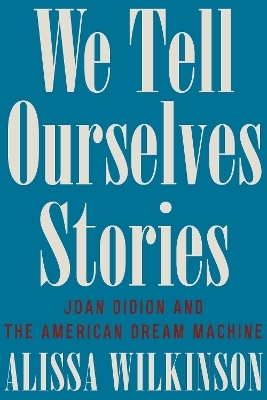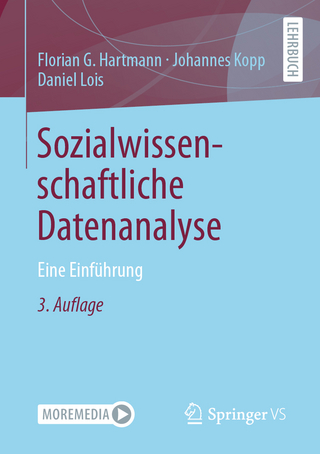
We Tell Ourselves Stories
Joan Didion and the American Dream Machine
Seiten
2025
WW Norton & Co (Verlag)
978-1-324-09261-2 (ISBN)
WW Norton & Co (Verlag)
978-1-324-09261-2 (ISBN)
- Noch nicht erschienen (ca. März 2025)
- Versandkostenfrei innerhalb Deutschlands
- Auch auf Rechnung
- Verfügbarkeit in der Filiale vor Ort prüfen
- Artikel merken
“Sharp, elegant and eye-opening... a crucial toolbox for understanding both Joan Didion and Hollywood.”—Emily Nussbaum
Joan Didion opened The White Album (1979) with what would become one of the most iconic lines in American literature: “We tell ourselves stories in order to live.” Today, this phrase is deployed inspirationally, printed on T-shirts and posters, used as a battle cry for artists and writers. In truth, Didion was describing something much less rosy: our human tendency to manufacture delusions that might ward away our anxieties when society seems to spin off its axis. Nowhere was this collective hallucination more effectively crafted than in Hollywood.
In this riveting cultural biography, The New York Times film critic Alissa Wilkinson examines Joan Didion’s influence through the lens of American myth-making. As a young girl, Didion was infatuated with John Wayne and his on-screen bravado and was fascinated by her California pioneer ancestry and the infamous Donner Party. The mythos that preoccupied her early years continued to influence her work as a magazine writer and film critic in New York, offering glimmers of the many stories Didion told herself that would come to unravel over the course of her career. But out west, show business beckoned.
We Tell Ourselves Stories eloquently traces Didion’s journey from New York to her arrival in Hollywood as a screenwriter at the twilight of the old studio system. She spent much of her adult life deeply embroiled in the glitz and glamor of the Los Angeles elite, where she acutely observed—and denounced—how the nation’s fears and dreams were sensationalised on screen. Meanwhile, she paid the bills writing movie scripts like A Star Is Born, while her books propelled her to celestial heights of fame.
Peering through a scrim of celluloid, Wilkinson incisively dissects the cinematic motifs and machinations that informed Didion’s writing—and how her writing, ultimately, demonstrated Hollywood’s addictive grasp on the American imagination. More than a portrait of a writer, We Tell Ourselves Stories shines a new light on a legacy whose impact will be felt for generations.
Joan Didion opened The White Album (1979) with what would become one of the most iconic lines in American literature: “We tell ourselves stories in order to live.” Today, this phrase is deployed inspirationally, printed on T-shirts and posters, used as a battle cry for artists and writers. In truth, Didion was describing something much less rosy: our human tendency to manufacture delusions that might ward away our anxieties when society seems to spin off its axis. Nowhere was this collective hallucination more effectively crafted than in Hollywood.
In this riveting cultural biography, The New York Times film critic Alissa Wilkinson examines Joan Didion’s influence through the lens of American myth-making. As a young girl, Didion was infatuated with John Wayne and his on-screen bravado and was fascinated by her California pioneer ancestry and the infamous Donner Party. The mythos that preoccupied her early years continued to influence her work as a magazine writer and film critic in New York, offering glimmers of the many stories Didion told herself that would come to unravel over the course of her career. But out west, show business beckoned.
We Tell Ourselves Stories eloquently traces Didion’s journey from New York to her arrival in Hollywood as a screenwriter at the twilight of the old studio system. She spent much of her adult life deeply embroiled in the glitz and glamor of the Los Angeles elite, where she acutely observed—and denounced—how the nation’s fears and dreams were sensationalised on screen. Meanwhile, she paid the bills writing movie scripts like A Star Is Born, while her books propelled her to celestial heights of fame.
Peering through a scrim of celluloid, Wilkinson incisively dissects the cinematic motifs and machinations that informed Didion’s writing—and how her writing, ultimately, demonstrated Hollywood’s addictive grasp on the American imagination. More than a portrait of a writer, We Tell Ourselves Stories shines a new light on a legacy whose impact will be felt for generations.
Alissa Wilkinson is a film critic at the New York Times and was formerly a senior correspondent and critic at Vox. Her previous book, Salty: Lessons on Eating, Drinking, and Living from Revolutionary Women, was published in 2022. She lives in Brooklyn, New York.
| Erscheint lt. Verlag | 11.3.2025 |
|---|---|
| Verlagsort | New York |
| Sprache | englisch |
| Maße | 152 x 229 mm |
| Themenwelt | Literatur ► Biografien / Erfahrungsberichte |
| Kunst / Musik / Theater ► Film / TV | |
| Sachbuch/Ratgeber ► Geschichte / Politik | |
| Sozialwissenschaften ► Kommunikation / Medien ► Medienwissenschaft | |
| Sozialwissenschaften ► Soziologie ► Gender Studies | |
| ISBN-10 | 1-324-09261-0 / 1324092610 |
| ISBN-13 | 978-1-324-09261-2 / 9781324092612 |
| Zustand | Neuware |
| Informationen gemäß Produktsicherheitsverordnung (GPSR) | |
| Haben Sie eine Frage zum Produkt? |
Mehr entdecken
aus dem Bereich
aus dem Bereich
Eine Einführung
Buch | Softcover (2022)
Springer VS (Verlag)
32,99 €
wie KI und virtuelle Welten von uns Besitz ergreifen – und die …
Buch | Hardcover (2023)
Heyne (Verlag)
22,00 €


